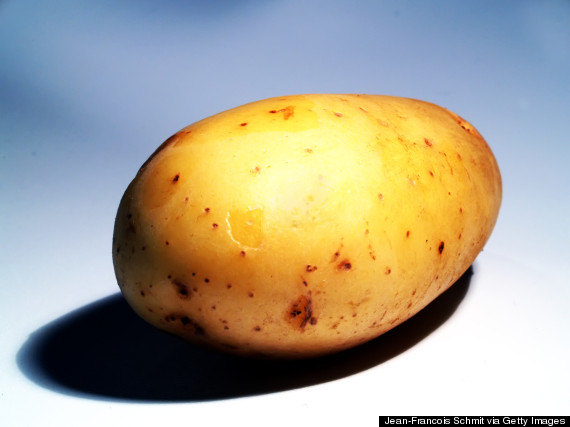
The potato isn't inherently bad, and, really, it shouldn't be treated as such.
Yes, it's often smothered in cheese, mixed up with mayo, doused in sour cream or deep-fried -- but when it isn't is when the potato truly shines. In its purest, most potato-y (and perhaps organic) form, it actually packs some very real health perks. Here are five very good reasons to love potatoes.
They're loaded with potassium.
One large spud baked with the skin on contains a whopping 1,600 milligrams of potassium, nearly half the recommended amount for an entire day and almost four times as much as a medium banana, famed for its potassium count. Not only is it an essential electrolyte key to hydration and athletic performance, potassium may also play a role in lowering blood pressure.
Potatoes are packed with fiber.
If you eat the skin, at least. That same large spud contains 7 grams of dietary fiber, about a quarter of what you should aim for in a day -- but without the skin that fiber count drops to just 1 gram. A diet rich in fiber will not only help you stay fuller for longer (thereby leading to less snacking), it's also been shown to reduce heart attack risk, lower cholesterol and help prevent diabetes.
They've got a hearty dose of vitamin C.
Also in the skin of your potato is a solid amount of vitamin C -- you'll nab nearly 29 milligrams of the stuff in a large tater, to be exact, nearly half of your goal for the day, and more than a third of the amount found in famed vitamin C deliverer, the orange. While getting enough C probably won't nip a cold in the bud, it plays an important role as an antioxidant and helps heal wounds.
Potatoes are a good source of manganese.
You might be less familiar with this nutrient, but that doesn't mean you don't need it. Manganese plays an essential role in processing protein, carbs and cholesterol and may also be involved in bone formation, according to WebMD. One large potato with the skin on contains 33 percent of your recommended daily amount of manganese.
And they're rich in vitamin B6.
This vitamin does much of its work "behind the scenes," American Dietetic Association spokesperson Dee Sandquist, MS, RD, CD, told Everyday Health, but it's working hard, in the cardiovascular, digestive, immune, muscular and nervous systems. It also produces essential brain hormones, the website reported. With 46 percent of your daily recommended B6, a potato (with the skin!) is a good place to start.
